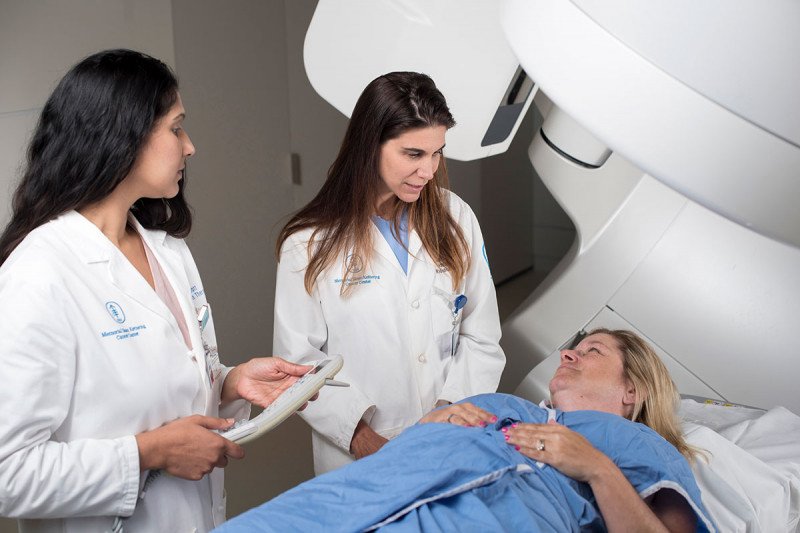
Radiation oncologist Melissa Zinovoy (right) and chief radiation therapist Beeban Natt with a patient at MSK Westchester.
Radiation treatment is one of the most common and effective ways to destroy cancer cells and shrink tumors. At Memorial Sloan Kettering, approximately half of our adult cancer patients undergo radiation therapy as a primary treatment or as part of a broader approach that includes chemotherapy, surgery, or other therapies. For many cancers, radiation therapy may be all that is needed to treat the disease.
There are different ways to deliver radiation treatment. With external-beam radiation therapy, treatment is delivered from a machine outside the body. With internal radiation (brachytherapy), sealed sources of radioactivity are placed near or within the tumor. Less commonly, radiation treatment can also be given using liquid materials in capsules by mouth or infusion through a vein (systemic radiation).
Although radiation treatment has been widely used for decades, there still is confusion and misunderstandings about its safety. We asked MSK clinical physicist Lawrence Dauer and medical physicist Matthew Williamson to tell us about the concerns they hear most frequently from patients and their families — and the answers and reassurance they provide.
Will receiving external-beam radiation make me radioactive or able to expose others to radiation?
External-beam therapy, the most common type of radiation treatment, does not make a person radioactive in any way. It is applied most often in the form of x-rays by a linear accelerator. The therapy is designed to deliver precise amounts of energy to tumor cells while sparing healthy tissue. The radiation is present only when the linear accelerator is operating. When you receive external-beam radiation, you are unable to contaminate or transfer that radiation to any other person.
How can I be sure that the external-beam radiation machine isn’t damaging normal, healthy tissue in my body?
We have carefully developed methods for calibrating radiation beams to ensure they reach the areas they are intended to target. Even when nearby normal tissues receive small amounts of radiation, it is rare for long-term damage to occur. Our doctors and physicists also know how much radiation healthy tissue can receive without causing significant damage. They use this information to develop a patient-specific treatment. We often use special masks, molds, or casts of body parts to keep you completely still during treatment so that we can aim the radiation beams precisely to the area that needs to be treated.
Is there any risk that internal radiation implants (brachytherapy) will leak or break free from where they are placed and move around my body?
With brachytherapy, we use a needle or a catheter to insert radioactive material contained within a sealed source such as a seed, pellet, wire, or capsule. As the radioactive material inside the implants decays naturally over time, it emits radiation that deposits energy to treat nearby cancer cells. This radioactivity travels only a certain distance beyond the implant. Within a few weeks or months, the implant no longer gives off any radiation. The implants are specially tested and sealed to ensure that the encapsulated radioactive material doesn’t leak, and we place them in such a way that it’s highly unlikely they will move. We give people specific precautions to minimize exposure to others from the implanted radioactive material.
Should I limit contact with anyone while brachytherapy implants are inside my body?
Most of our safety concerns are related to being in physical contact with children for extended periods of time because their bodies are undergoing such rapid change and growth. Because we vary the radiation dose in each implant as well as the number of implants we insert based on your particular cancer, we provide you with specific advice about precautions to take when you’re in close contact with children.
Do prostate seed implants put my sexual partner or the person I sleep next to at risk in any way?
Prostate seeds are sealed sources. You cannot contaminate another person by being in his or her physical vicinity, during sexual intercourse, or through any other form of intimate contact. Your doctor or a member of the radiation safety staff will discuss any special precautions you should take with sleep arrangements before you leave the hospital. For example, based on such factors as your age and the age of your partner, we may ask that for a short time you avoid embracing your partner from the back in the “spooning” position through the night.
Do I pose a danger to others after receiving radioactive iodine therapy for thyroid cancer?
Radioactive iodine treatment involves swallowing a capsule or liquid form of radioactive iodine that all thyroid cells take up (absorb), destroying them. It’s effective because other healthy cells in the body don’t usually absorb the radioactive iodine.
For several days following this therapy, radioactive substances can be emitted through body fluids such as saliva, urine, and sweat. We send patients home with detailed instructions on how to care for themselves for the first few days — from limiting contact with young children and pets to using separate utensils and towels.
I am having an imaging test using radioactive materials. Will I be radioactive after the test?
Doctors sometimes use small amounts of radioactive material to diagnose disease. This is called nuclear medicine. The radioactive substance is injected into your body, locating specific cells or tissues ― including cancer cells ― and binds to them. The radioactive material will stay in your body for several hours or days, depending on the type that is used. Eventually, the material decays and your body naturally flushes it out through urine, sweat, and other forms of biological elimination. We make sure the specifics are clear to you before the test, and we may also issue an information card explaining your treatment in case you are questioned by someone in airport security, for example. You can learn more about nuclear medicine approaches here.




